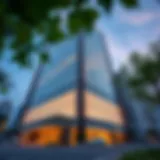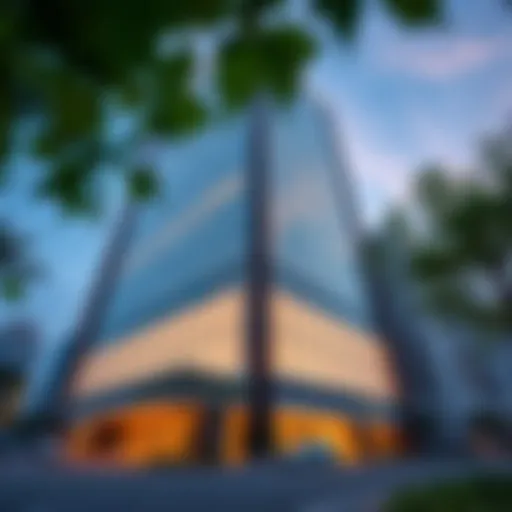Ras Al Khor: Dubai's Building Materials Hub
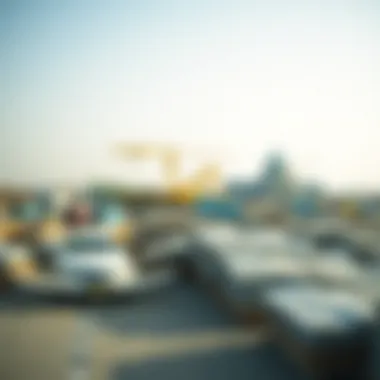

Intro
Ras Al Khor holds an esteemed position in the heart of Dubai's building materials market. It’s not just a geographical location; it’s a vibrant hub where history intersects with modernity. As Dubai continues its relentless push towards becoming a global city, understanding the foundational role Ras Al Khor plays provides critical insights for stakeholders in real estate and construction.
This region has evolved over the years, and today, it stands as a testament to how innovative practices can intertwine with traditional resources. From its historical roots in the supply of raw materials to the present-day trends favoring sustainable options, Ras Al Khor encapsulates a narrative of growth and adaptation. This article takes a comprehensive look at this transformation, diving deep into the variety of materials produced, the implications of sustainability, and the regulatory frameworks shaping the industry.
Decoding the complexities of Ras Al Khor helps to paint a clearer picture of its market dynamics. It’s essential information for investors, property managers, and buyers looking to navigate the intricate landscape of building materials in this growing metropolis. Here, we embark on an exploration that not just informs but equips stakeholders with valuable perspectives, ensuring informed decision-making in both current and future real estate projects.
Prelims to Ras Al Khor
Ras Al Khor is more than just a geographic location in Dubai; it’s a cornerstone of the city’s building materials market. Understanding Ras Al Khor is like peeling back the layers of Dubai’s rapid urban evolution, revealing how essential this area is to sustaining the ever-growing structural demands of the city. From historical significance to modern implications, the role of Ras Al Khor becomes clearer when you consider its impact on both local industry and global markets.
Geographical and Historical Context
Nestled between the shimmering waters of the Arabian Gulf and Dubai’s bustling urban landscape, Ras Al Khor is known for its unique wetlands and wildlife as well as for its industrial zones. The name itself translates to 'Head of the Creek', a nod to its historical importance as a trade route and a resource hub.
The area has been associated with various industries since the mid-20th century. Initially, it served primarily as a fishing and pearling area. Over the decades, as Dubai began to modernize and develop, Ras Al Khor transformed into a vital manufacturing and supply center for building materials. Its proximity to Dubai's other key areas—like Downtown Dubai and the Dubai Marina—enhances its geographical advantage, making it a strategic point for logistics and distribution. Not only is it accessible by major roads, but the proximity to the ports facilitates easier importation and exportation of various materials.
Importance in Dubai’s Urban Development
In the grand scheme of Dubai’s urban development, Ras Al Khor stands out for its contributions to both the economy and infrastructure. As the city continues to evolve with skyscrapers and expansive residential communities, the demand for construction materials has skyrocketed. Ras Al Khor caters to this demand by offering a wide range of materials—from the cement that forms the backbone of buildings to the steel that provides essential structural support.
Additionally, the area plays a significant role in meeting international construction standards. The industrial operations here are not just about raw production; they are also focused on quality assurance and innovative practices. Companies operating within Ras Al Khor are often on the cutting edge of improvements in sustainable practices, positioning themselves to meet the expectations of a more environmentally conscious market.
The integration of new technologies and sustainable materials production positions Ras Al Khor not just as a local supplier but as a potential global player in the building materials sector.
"Ras Al Khor is a vital hub that connects local supply chains with global markets, ensuring that Dubai’s construction industry remains resilient and forward-looking."
Overall, understanding Ras Al Khor is pivotal for stakeholders in Dubai's construction landscape. Whether you are an investor looking to dive into local real estate or a property manager overseeing large-scale developments, knowledge of this region’s role in building materials provides insight that transcends mere transactions. It is about grasping the essence of a city that never stops building its dreams.
Types of Building Materials in Ras Al Khor
Ras Al Khor stands as a pivotal hub in Dubai's building materials market. This area fuels a sizeable chunk of the construction endeavors across the Emirate. Understanding the types of building materials available here can shed light on their significance not just to local construction, but also to broader architectural trends influencing Dubai's urban landscapes.
Diverse types of materials come into play, each serving unique functions and catering to different construction requirements. From traditional materials like cement and concrete to innovative sustainable options, the variety is staggering. Choosing the right materials influences timeframes, budgets, and ultimately, the durability of structures that will stand the test of time.
Cement and Concrete Variations
At the very core of construction lie cement and concrete variations. These materials form the backbone of buildings, roads, and other infrastructures, making them indispensable in Ras Al Khor's market.
Cement production typically incorporates locally sourced ingredients that enhance quality while reducing transportation time and costs. Ras Al Khor's proximity to raw materials significantly contributes to its reputation as a major supplier in the region. The local cement plants offer various grades suitable for a multiplicity of applications, from residential projects to industrial complexes.
Concrete, on the other hand, has evolved over the years. Standard concrete mixes are now accompanied by specialized varieties, including high-strength concrete and eco-friendly alternatives. These specialized concrete types often cater to specific structural demands, allowing for creativity in design while ensuring performance and sustainability. The ongoing research into additives like fly ash and slag are helping improve the environmental footprint of concrete production.


Steel and Metal Products
Steel and metal products have also found their place under Ras Al Khor's industrious umbrella. The demand for steel has only grown, driven primarily by construction sectors eager to make their projects more robust and resilient.
Steel, being highly versatile, finds itself in the framework of skyscrapers and various commercial properties. Local fabricators and manufacturers in Ras Al Khor produce a wide array of steel products, including rebar, structural steel, and even custom-designed metal components. This array of metal materials provides builders with flexibility in design while guaranteeing sturdiness that holds up against environmental challenges, particularly in the precarious climate of the UAE.
Understanding the local market dynamics is essential for anyone looking to dive into building endeavors within Ras Al Khor. The interplay between steel manufacturers and concrete producers creates a synergy that enhances project efficiency and fosters collaboration among stakeholders.
Sustainable Materials and Innovations
The concept of sustainability has taken root in Ras Al Khor’s building materials sector. With increasing awareness surrounding environmental impacts, many local producers are embracing sustainable practices in their operations. This transition is not merely a trend but a pressing necessity driven by regulatory frameworks and a conscious shift in consumer preferences.
Innovative materials such as recycled aggregates, energy-efficient insulation, and green concrete are becoming commonplace. These options reduce waste and minimize the carbon footprint associated with traditional building materials. For instance, the use of recycled plastics in composite materials offers remarkable strength while addressing the urgent problem of plastic waste.
Furthermore, local companies are investing in research and development for innovative energy-saving technologies, such as solar reflective paints and green roofs. Not only do these advancements align with Dubai's vision for sustainable growth, but they also ensure healthier built environments.
Economic Impact of Building Materials
The economic implications of the building materials industry can’t be overstated, especially in a rapidly growing urban landscape like Dubai. From generating job opportunities to influencing local market dynamics, the building materials sector is a cornerstone of economic development in Ras Al Khor and beyond. Understanding these elements helps stakeholders map out potential investments and gauge the long-term viability of projects.
Contribution to Local Economy
The ripple effects of the building materials market on the local economy are substantial. Ras Al Khor is home to numerous suppliers and manufacturers that serve not only the immediate vicinity but also broader markets. The revenues generated from building materials contribute significantly to the region's GDP. Companies like Gulf Cement Company are pivotal, providing necessary materials that fuel ongoing construction projects across Dubai, creating a cycle of income that benefits various sectors.
- Increased Business Activity: As construction booms, local suppliers often see an uptick in orders. This creates a symbiotic relationship whereby building material suppliers and construction firms rely on each other, driving commerce to unprecedented levels.
- Tax Revenue Generation: Higher business activity translates into greater tax revenues for local governments. These funds can be reinvested into infrastructure, education, or healthcare, creating a more rounded economic environment.
- Enhanced Real Estate Development: The availability of quality materials leads to better construction practices, subsequently increasing the value of properties. Higher property values translate into wealth for home investors and boosts the local economy as affluence spreads.
Job Creation and Workforce Development
Job creation remains one of the most visible impacts of Ras Al Khor’s building materials industry. As firms evolve and expand, they require a skilled workforce to operate machinery, manage operations, and oversee logistics. This need ushers a wave of training and apprenticeship opportunities, which can substantially uplift community skill levels.
- Training Programs: Companies often run their own training initiatives or partner with local institutions to enhance the skill set of potential employees. For example, partnerships with vocational training programs help elevate local talent, making it industry-ready.
- Diversity in Job Opportunities: The spectrum of roles—ranging from factory design engineers to logistic coordinators—means diverse opportunities exist for varying skill sets. Positions are not just limited to blue-collar workers; there are significant roles for project managers, engineers, and environmental specialists as well.
- Career Advancement: Workers who start in lower-level positions can progress as they acquire experience and skills. This potential for career advancement makes the industry appealing to many, ensuring a steady influx of talent.
Global Export Potential
The building materials sector in Ras Al Khor holds promising prospects not only domestically but also on a global scale. As countries worldwide focus on infrastructure development, Dubai's strategic location positions it favorably for international trade in materials.
- Strategic Location: Ras Al Khor's closeness to shipping routes facilitates smoother export processes, making the region an appealing hub for international distribution.
- Quality Standards: Many companies prioritize adhering to international quality standards, which opens up markets abroad. Firms that comply with ISO and other regulations significantly enhance their exportability, meeting the demands of foreign buyers.
- Growing International Interest: With increasing developments in areas like Africa and Southeast Asia, the demand for quality building materials is on the rise. Companies in Ras Al Khor can leverage this global demand for their products, maximizing profit potential while promoting Dubai as a significant player on the world stage.
"The building materials industry is not merely a sector; it is the lifeblood of Dubai's expanding architecture and future economic growth."
By investing in local suppliers and understanding the economic impact deeply, investors and property managers can make informed decisions that positively shape the future of building in Dubai.
Sustainability Practices in Building Materials Production
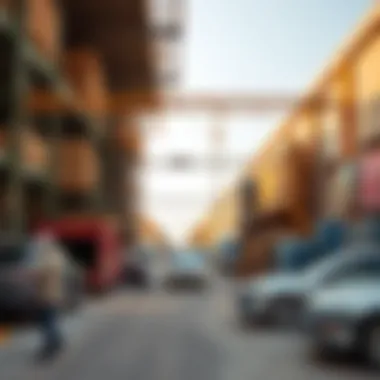

Sustainability is not just a buzzword; in the context of Ras Al Khor's building materials production, it represents a fundamental shift towards eco-friendly practices. This is vital for maintaining the balance between rapid urban growth in Dubai and environmental conservation. As an industrial hub, Ras Al Khor serves as a case study in the integration of sustainable practices within building materials manufacturing, impacting various stakeholders from investors to property managers.
Environmental Regulations and Compliance
The groundwork for sustainability in Ras Al Khor is significantly influenced by stringent environmental regulations. These laws aim to manage resource usage and minimize the ecological footprint of construction activities. For instance, compliance with regulations from the Dubai Municipality and the UAE’s Ministry of Climate Change and Environment sets a benchmark for material producers.
Manufacturers in the area are often mandated to adopt cleaner technologies that not only curtail emissions but also promote resource efficiency. An example of this is the use of dust suppression systems in cement manufacturing processes, which helps in significantly reducing air pollution. By staying compliant, companies not only assure their operational sustainability but also enhance their market reputation.
Recycling and Waste Management Initiatives
In Ras Al Khor, recycling and waste management have become cornerstone practices for the sustainable production of building materials. The construction industry is notorious for generating a massive amount of waste, but initiatives are underway to transform this challenge into an opportunity.
- Concrete can be crushed and reused as aggregates for new constructions.
- Metals from old buildings are often collected and melted down for new steel products.
- Wood waste is repurposed into secondary products, reducing deforestation.
These recycling efforts do not only alleviate pressure on landfills but also significantly lower the costs associated with raw material acquisition. Businesses engaging in these practices not only save money but also appeal to environmentally conscious consumers, thus widening their market base.
Impact on Urban Planning
The push for sustainable building materials is reshaping urban planning in Dubai, particularly in Ras Al Khor. Planners are now more inclined to prefer projects that incorporate sustainable materials, resulting in a shift in development priorities. This has led to several tangible outcomes:
- Green Building Codes: Integrating sustainability into regulatory frameworks encourages developers to adopt energy-efficient designs.
- Sustainable Communities: New projects are often designed to incorporate green spaces and local ecosystems, improving the livability of urban environments.
- Long-term Vision: With sustainable materials at the forefront, the emphasis has shifted towards resilience against climate change, ensuring that structures can withstand environmental stressors.
Ultimately, the alignment of sustainability practices with urban planning in Ras Al Khor fosters not just economic growth, but also community well-being and environmental stewardship.
Challenges Facing the Building Materials Sector
The building materials sector in Ras Al Khor is not without its hurdles. As Dubai continues to grow, the infrastructure needs escalate, placing pressure on suppliers to keep pace. However, various challenges—each interconnected—create a tricky landscape for this vital industry. Understanding these challenges is key for investors, property managers, and buyers, as they influence decision-making and project timelines.
Supply Chain Disruptions
Supply chain disruptions can make or break the building materials sector. Logistics can be thrown into a tailspin by anything from global pandemics to local regulatory changes. For instance, during the COVID-19 pandemic, many construction projects found themselves stalled due to delays in raw materials transportation. This isn’t merely theoretical; real-world examples span across industries, showing how one kink in the supply chain leads to a domino effect. Timely delivery, which once seemed like a given, turned into a gamble. The need for a more resilient supply chain has never been more crucial. Suppliers are now looking into alternative sourcing strategies and digital solutions to make themselves less vulnerable.
Market Competition and Pricing Pressures
The competitive landscape in Ras Al Khor is fierce, with multiple players vying for a slice of the pie. This aggressive competition means that businesses cannot afford to rest on their laurels when it comes to pricing. To keep competitive, firms often engage in price wars, which may not always reflect the value of quality materials. The pressure to maintain reasonable prices forces some suppliers to cut corners, sacrificing quality for profit. Additionally, fluctuating prices of raw materials—dictated by global market trends—create a further challenge. A contractor might find themselves under significant pressure to deliver within budget, but what happens when the price of steel suddenly spikes? Such unpredictability can lead to project delays and strained client relationships.
Technological Advances and Adaptation
As technology evolves, so too must the sector adapt or risk obsolescence. From BIM (Building Information Modeling) to 3D printing, advances provide unique opportunities but do not come without their own challenges. Companies that ignore these technological shifts may find themselves outpaced by competitors who embrace innovation. Yet implementing new technologies requires investment and a shift in company culture, both of which can be formidable barriers. Training staff and adjusting workflows is no small feat. In Ras Al Khor, successful firms are those that acknowledge the necessity of these adaptations. They foster an agile environment where innovation is celebrated rather than resisted.
"Adaptation in the face of change is no longer an option; it's an obligation for thriving in the building materials market."
Future Trends in Building Materials
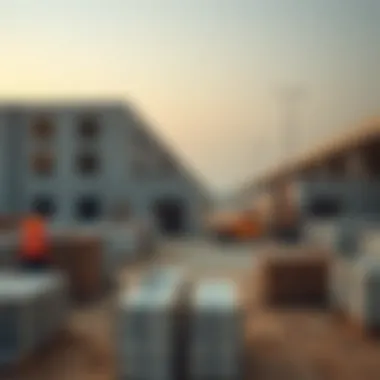

As the construction landscape evolves, staying ahead of the curve with future trends in building materials becomes vital for stakeholders. This section focuses on significant advancements and shifts—considering not just technological growth, but also economic and social dimensions that will shape the sector in Ras Al Khor and beyond. The importance of this topic lies in understanding how approaches to materials are adapting to meet new demands and challenges, making it essential reading for investors, buyers, and property managers alike.
Emerging Technologies and Innovations
In recent times, innovative technologies have propelled the building materials industry into a new era. 3D printing, for instance, has begun to revolutionize how structures are assembled. Rather than focusing on traditional methods of construction, 3D printing allows for quicker, more efficient building processes, reducing waste. Materials produced are often lighter and more resilient, critical factors that resonate with modern construction needs.
Another burgeoning technology is the use of biomaterials. These materials, derived from natural processes, are not only environmentally friendly but also exhibit unique properties that can enhance durability and performance. For example, mycelium-based goods, harnessed from fungi, can serve as sustainable insulation and packaging material with impressive strength.
Furthermore, augmented reality (AR) and virtual reality (VR) are becoming increasingly utilized in this sector for design visualization and project management. These tools help stakeholders make informed decisions by bridging the gap between imagination and reality, minimizing errors before construction even begins.
"The future belongs to those who believe in the beauty of their dreams." – Eleanor Roosevelt. This quotation reflects how striving for innovation can cultivate a more resilient and aesthetically pleasing built environment.
Changing Consumer Preferences
In recent years, the consumer's appetite has begun to shift, placing higher demand on sustainable and ethically sourced building materials. Investors and property managers cannot ignore the power of this trend, as buyers are increasingly opting for homes made from materials that have a lower environmental footprint.
Perhaps a decade ago, the aesthetic beauty of materials was the primary concern for most homeowners. However, practical concerns—such as energy efficiency and overall impact on health—are now at the forefront. For example, materials that enhance energy efficiency, like insulated concrete forms or green roofs, are gaining traction among buyers.
Transparency and ethics are no longer optional attributes but essential factors driving consumer choice. This has forged a new path where manufacturers are compelled to disclose the origins and sustainability of their materials, shooting straight for a growing eco-conscious market.
Integration of Smart Building Solutions
As technology permeates our daily lives, smart building solutions are transitioning from niche to necessity. The integration of Internet of Things (IoT) devices within building materials heralds a new era where structures can respond dynamically to their environment. Smart glass, which tints automatically with sunlight exposure, can significantly improve indoor comfort and energy consumption—an asset particularly valuable in Dubai's sunny climate.
Moreover, integrating automation in construction processes not only streamlines operations but enhances accuracy. Building Information Modeling (BIM) facilitates better project collaboration and visualization, leading to superior outcomes and fewer costly mistakes.
The rise of smart building solutions intersects neatly with changing consumer preferences. Buyers no longer simply seek shelter; they desire versatile, responsive spaces that can adapt to their needs. This wave of intelligent building systems indicates a bright future, where our spaces become not just functional but symbiotic with our lifestyles.
The End: The Role of Ras Al Khor in Shaping Dubai’s Building Future
Ras Al Khor stands as a cornerstone in the architectural and construction landscape of Dubai. Its strategic location and rich array of building materials have fundamentally shaped the urban growth and infrastructure of this bustling emirate. This section synthesizes the critical insights gathered throughout the article, emphasizing the pivotal role that Ras Al Khor plays in the broader context of Dubai’s development.
Summarizing Key Insights
In examining Ras Al Khor, we see a multifaceted resource that doesn’t just supply materials but also supports the entire ecosystem of construction and urban design. The varying types of materials like cement and steel produced here showcase the adaptability and innovation within the industry.
- Historical Significance: Ras Al Khor's past as a resource hub has laid the foundation for its modern-day influence on Dubai's skyline.
- Economic Impact: The materials generated contribute significantly to Dubai's economy, bolstering local jobs and generating revenue through both local usage and exports.
- Sustainability Practices: Initiatives taken to recycle and manage waste highlight a forward-thinking approach toward environmental responsibility.
- Future Prospects: With emerging smart technologies and a shift in consumer preferences, Ras Al Khor is poised to evolve further, adapting to new challenges while maintaining its integral role in Dubai’s construction framework.
"Ras Al Khor is not just about materials; it's the lifeblood that fuels Dubai’s unyielding ambition to reach new heights in architecture and urban living."
Reflections on Future Prospects
The future of Ras Al Khor is bright, marked by a continuous stream of advancements in technology and a heightened focus on sustainable building practices. Importantly, the emergence of smart building solutions will likely change the way materials are used. The integration of IoT devices, for example, offers ways to enhance efficiency and reduce waste.
Investors and stakeholders should keep an eye on innovations in construction materials, such as bio-based products or improved recycling processes, as these can offer new avenues for investment that align with ethical standards and consumer expectations.
Challenges such as fluctuating market demands and competition from global suppliers must also be taken into consideration. Yet, with a robust emphasis on sustainability and community-centric development, the prospects for Ras Al Khor remain encouraging.
As the building materials market evolves, the role of Ras Al Khor will undoubtedly shift and expand, reinforcing its significance not only in Dubai but also as a model for urban development worldwide.
Ras Al Khor represents more than just a location; it embodies the future of construction in a fast-paced, innovation-driven world.
